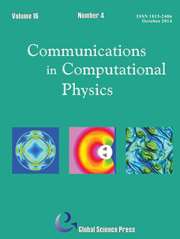Article contents
A Probabilistic Automatic Steady State Detection Method for the Direct Simulation Monte Carlo
Published online by Cambridge University Press: 02 November 2016
Abstract
The statistical error associated with sampling in the DSMC method can be categorized as type I and II, which are caused by the incorrect rejection and acceptance of the null hypothesis, respectively. In this study, robust global and local automatic steady state detection methods were developed based on an ingenious method based purely on the statistics and kinetics of particles. The key concept is built upon probabilistic automatic reset sampling (PARS) to minimize the type II error caused by incorrect acceptance of the samples that do not belong to the steady state. The global steady state method is based on a relative standard variation of collisional invariants, while the local steady state method is based on local variations in the distribution function of particles at each cell. In order to verify the capability of the new methods, two benchmark cases — the one-dimensional shear-driven Couette flow and the two-dimensional high speed flow past a vertical wall—were extensively investigated. Owing to the combined effects of the automatic detection and local reset sampling, the local steady state detection method yielded a substantial gain of 30-36% in computational cost for the problem studied. Moreover, the local reset feature outperformed the automatic detection feature in overall computational savings.
Keywords
MSC classification
- Type
- Research Article
- Information
- Copyright
- Copyright © Global-Science Press 2016
References
- 2
- Cited by


